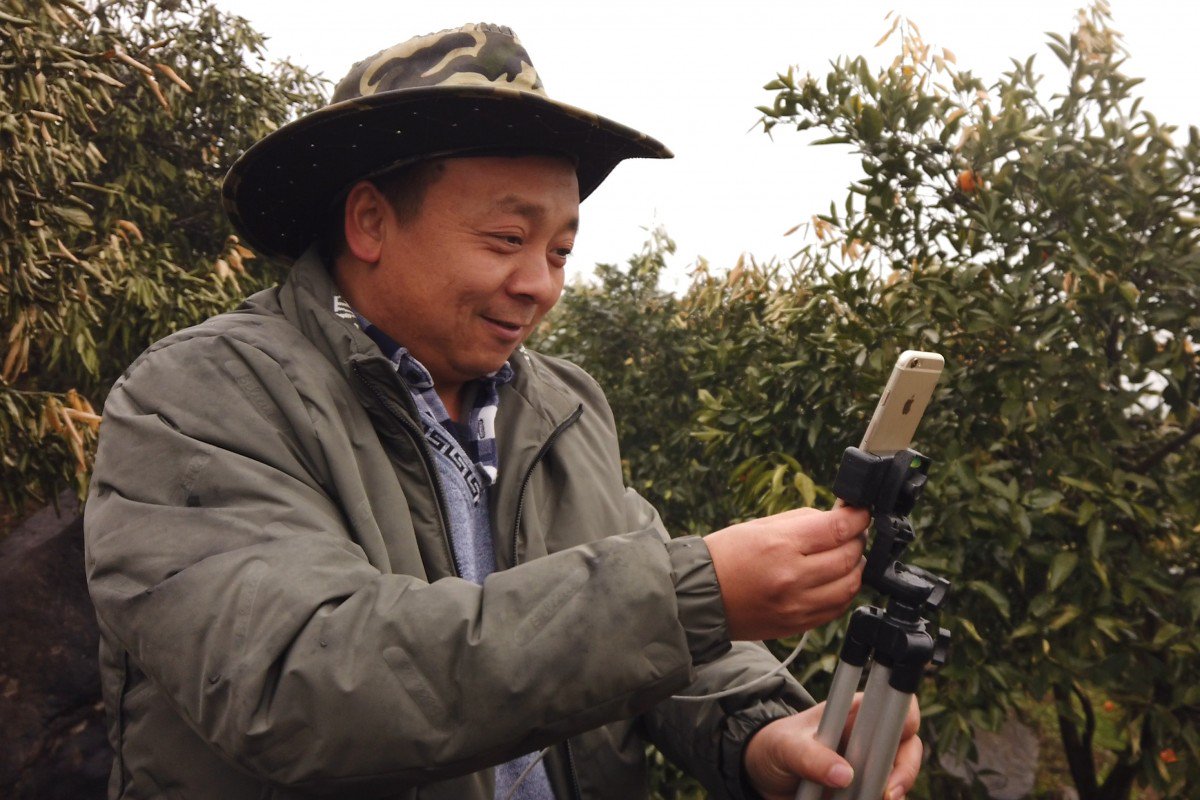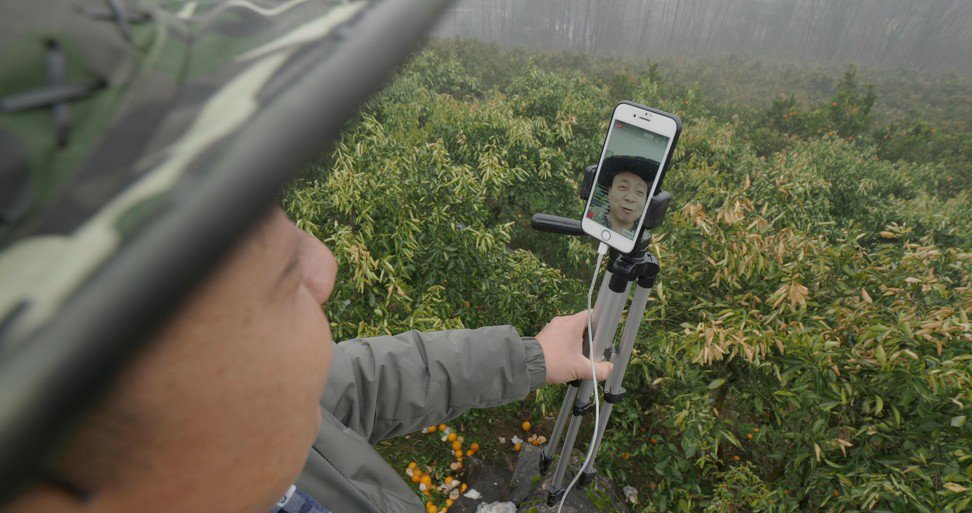It was on top of a hill, in the orange orchards on the outskirts of Zhangjiajie, a city in northwestern China’s Hunan province, where Zhong Haihui took a big leap from being a fruit farmer to become a live-streaming video star.
Neighbors in his farming community were initially bewildered in 2017 at the sight of Zhong, wearing a cowboy hat and standing on a big rock, talking passionately for hours in front of his smartphone about the fruits grown in his hometown.
Two years later, the 40-year-old Zhong has found more farmers across the country jumping on the live-streaming video bandwagon to promote and sell their produce to millions of consumers in the world’s second-largest economy.

“Everything felt awkward when we first started,” said Zhong in an interview. “But [now] we see that everybody else is doing it.”
Zhong was one of the first farmers in Hunan to start selling his fruits via live streams, reaching consumers across the country via short video-sharing platform Kuaishou and the e-commerce app from Alibaba Group Holding’s Taobao Marketplace. New York-listed Alibaba is the parent company of the South China Morning Post, while Abacus is a unit of the Post.
Zhong said he is more talkative and energetic when chatting with his followers online. He refers to himself as “Uncle”, a nickname that his followers gladly use.
He calls his viewers bao bao, which translates to “baby” in English. It is also a common term used by Taobao live streaming hosts to address their audience, which makes them appear friendly as well as help them build rapport.
Zhong’s typical spiel: “Welcome, new babies! Tap follow if you haven’t! Follow Uncle and there will be more tasty food later!”

Fruit farmer Zhong Haihui, from central China’s Hunan province, has started traveling around the country to do live-streaming video from various local orchards. Photo: Chris ChangShare:
That is a line he goes back to almost every other minute on video, while promoting his farm’s fruits during an unscheduled live stream at 10 am when Abacus visited his farm just before the Lunar New Year in February. Hundreds tuned in within seconds.
In the same segment, Zhong also panned his camera to the mountains, hummed a random tune and asked his audience if they had already eaten. Zhong and his 21-year-old business partner named Xiaoqiang took turns to address almost every single question that popped up on the phone, most of which were about what fruits they were selling that day or when they would resume business after the holiday. Other viewers offered holiday greetings to the two hosts.
When Zhong said he had to sign off in a few minutes, viewers tried to keep him online. “Don’t leave, Uncle. Stay and chat!” one viewer wrote, which made Zhong laugh.
Zhong previously worked at a petrol station and in a factory. In 2011, he opened an e-commerce shop on Taobao, selling local farm products. Sales, however, did not take off until late in 2017, when he started doing live-streaming video.
That was made possible by how the major apps in China support a range of services to keep their users glued to their platforms. So users can shop from Kuaishou, which was originally designed as a short-form video-sharing platform, like they would on Taobao, which supports live-streaming video for the merchants on its site.
Although there are no official government estimates on how many farmers across the country are currently using live streams to sell their products, both Taobao and Kuaishou are keen to help more farmers do business on their respective platforms.
Taobao said it aims to “incubate” 1,000 farmer live streamers in 100 counties this year, helping each of them earn more than 10,000 yuan (US$1,400) in monthly income.
Fruit farmer Zhong Haihui hops on top of this rock when live-streaming video because it is the only spot on his farm at Zhangjiajie, a city in central China’s Hunan province, where he can get steady internet connection. Photo: Chris ChangShare:
By Kuaishou’s own estimates, its platform has more than 1 million rural users selling local products through both short videos and live streaming. These users earned a total of 19 billion yuan (US$2.65 billion) last year, it said.
China saw explosive growth in live streaming in 2016, when the market grew 180 per cent to 20.8 billion yuan from the previous year. Both platform operators and live-streaming video stars raked in billions by taking cuts from tips given to streamers by viewers.
Another factor credited with helping farmers sell via live streams is the growing concern over food safety in China, which has made more people tune in to see the places where the produce they consume comes from.
Zhong said he has been expanding his business on Taobao by partnering with local orchards around the country. He plans to do more live streams with these partners and ship fruits from their farms. He also wants to become a live streamer tour guide in Zhangjiajie.
A popular tourist destination with more than 1.4 million residents, Zhong’s hometown of Zhangjiajie is famous for its craggy mountain range, which includes peaks that bear a striking resemblance to those seen in the hit 2009 film Avatar. Trying to cash in on the film’s success, local government officials renamed one of the mountains as the “Avatar Hallelujah Mountain” in 2010, which resulted in a public backlash.
China’s live-streaming video market, however, has started to cool down because of stricter online censorship and waning user interest in the people who became popular on the format. In 2018, China saw a 6 per cent decline in total live streaming users to 396.8 million from 2017, according to the annual internet report by state agency China Internet Network Information Centre. It was the only online service category that saw a decline in users that year. In contrast, users of ride-hailing services grew 40.9 per cent.
While people may have lost interest in watching streamers do their song-and-dance acts, their focus has switched to more offbeat streamers, exemplified by farmers. Viewers in China’s large cities have become intrigued by village life as shown by live streamers from these areas.
Early on, Kuaishou was the subject of controversy for being full of videos that showed crude and silly stunts performed by rural users. That has changed, with more people tuning in to buy products from these rural areas.
Short-form video-sharing app operator Kuaishou says its users from rural areas in China earned a total of US$2.65 billion in 2018 by selling products on its platform.
There are village girls in China’s southwestern Guizhou province posting videos of cooking in the mountains, families living on the Sichuan Tibetan highlands having family dinners on the edge of a cliff, and small-town men producing parodies of The Avengers. Many of them also have shops on Kuaishou selling local products.
Zhong’s live stream channel now has more than 82,000 followers. But it was no easy feat to get there, especially for someone who is not used to being on camera or familiar with internet culture.
“It was so difficult to start calling people ‘baby’, especially since I’m not young any more,” Zhong said.
So he and his partner continue to do their research. They spend a lot of time watching other streamers and replay their own live streams. They discuss how to do better on their next stream even if their talks go well past midnight. And that is after 10 hours of live-streaming video every day.
“Coming home from a live stream, I usually don’t want to say a word anymore,” Zhong said. “I’ve run out of things to say.”
